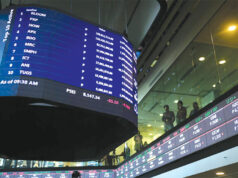Debt yields track US Treasuries’ climb
YIELDS on local government securities (GS) traded at the secondary market climbed last week amid increasing inflation expectations and rising US Treasury rates.
Debt yields, which move opposite to prices, went up by an average of 5.58 basis points (bps) week on week, based on the PHP Bloomberg Valuation (BVAL) Service Reference Rates as of March 19 published on the Philippine Dealing System’s website.
Yields on the 91-, 182- and 364-day Treasury bills increased by 3.93 bps, 10.61 bps, and 7.78 bps to 1.2772%, 1.4474%, and 1.9318%, respectively.
At the belly of the curve, the rates of the two-, three-, four-, five-, and seven-year Treasury bonds (T-bonds) rose 6.43 bps (2.5317%), 6.84 bps (2.9452%), 6.34 bps (3.2499%), 9.34 bps (3.5423%), and 23.06 bps (4.1061%), respectively.
Meanwhile, the 10-year T-bond went up by 8.69 bps to fetch 4.4636%, while the yields on the 20- and 25-year papers fell by 10.24 bps to 4.999% and 11.45 bps to 5.0009%, respectively.
“Local GS yields continue to weaken as risks of higher inflation remain and US Treasury yields ascend. The short-term rates are likewise subjected to the upward pressure given heightened inflation risks,” First Metro Asset Management, Inc. (FAMI) said in an e-mail.
FAMI added that even with risk aversion among investors due to the surge in coronavirus disease 2019 (COVID-19) cases, there hasn’t been any significant increase in demand for debt papers as inflation risks remain.
The US Federal Reserve expects growth in the world’s biggest economy to remain above trend for at least two years and pledged to keep the benchmark overnight interest rate to near zero despite expectations of inflation to pick up. Fed Chair Jerome Powell has said that the US economy is “clearly on a good path.”
The yield on the benchmark US 10-year note rose to 1.74% on Thursday — the first time it reached this level since January 2020.
Back at home, Bangko Sentral ng Pilipinas (BSP) Governor Benjamin E. Diokno said the central bank will remain accommodative, saying they are “not inclined” to tighten policy settings at this time as the inflation uptick is only temporary and is attributed mainly to supply-side pressures.
Inflation reached 4.7% in February, the fastest in 26 months, as food costs continue to rise.
This brought average inflation for the first two months to 4.5%, already above the 2-4% target set by the BSP.
The BSP Monetary Board will have its second policy-setting meeting for the year on Thursday. It maintained benchmark rates on Feb. 11, but raised its inflation forecast for this year to 4% from 3.2% previously.
ATRAM Trust Corp. Head of Fixed Income Jose Miguel B. Liboro pointed to the upcoming 10-year bond auction to be key in determining short-term movement in yields.
“Indicative interest in the market is looking at the issuance to clear higher than current levels, along the 4.3%-4.5% range,” he said in an e-mail.
“If the Bureau of the Treasury (BTr) finds the market bid too high at the 10-year auction and opts to reject, we could see some stabilization in the yield curve. Alternatively, given that inflation is expected to continue to adjust higher over the short-term, we feel that the BTr may opt to issue successfully within the range indicated above and that there would be sufficient market demand to keep it at those levels post-auction,” Mr. Liboro added.
The BTr wants to raise P160 billion from the local bond market this month, broken down into P100 billion in T-bills to be offered weekly and P60 billion via fortnightly auctions of T-bonds.
The government is looking to borrow P3 trillion this year from local and foreign lenders to help fund its budget deficit, which is seen to hit 8.9% of the country’s gross domestic product.
Meanwhile, FAMI said the government would need more funds to support economic recovery efforts, noting it expects the Treasury to accept higher rates in its auctions.
“Yields might find support next week from the FXTN 7-57 maturity which will inject P136 billion back to the market. Upward bias remains though for 10-year and longer ahead of the FXTN 10-65 reissuance on [Thursday],” FAMI added.
Security Bank Corp. Chief Economist Robert Dan J. Roces said in an e-mail that yields are expected to stay rangebound as players stay on the sidelines ahead of this week’s auction and as they remain “defensive given the movement of US Treasuries.” — Jobo E. Hernandez



